仁爱英语九年级上册Unit 1 Topic2重点笔记与知识点整合复习+综合训练题
仁爱英语九上unit1topic2重点知识

仁爱英语九上unit1topic2重点知识一、概述仁爱英语九上Unit1 Topic2的重点知识仁爱英语九上Unit1 Topic2的主题是“School Life”,本话题下的重点知识主要包括词汇、语法和句型。
通过本单元的学习,学生们将更好地了解和掌握日常校园生活中的常用词汇、语法结构和句型,从而提高他们的英语交际能力。
二、重点知识点解析1.词汇解析在本单元中,我们需要学习一些与校园生活相关的词汇,如:classroom、library、playground、schoolbag、pencilcase等。
通过学习这些词汇,学生们可以更好地描述自己的学校环境和学习用品。
2.语法解析本单元的语法重点是现在进行时。
现在进行时用于表示现在正在进行的动作,其构成是“be动词+现在分词”。
例如:I am listening to music.(我正在听音乐。
)通过掌握现在进行时,学生们可以更准确地描述自己在某一时刻正在做的事情。
3.句型解析本单元的句型重点包括以下几种:- 询问对方正在做什么:What are you doing?- 回答对方正在做的事情:I"m doing...- 表达自己正在做的事情:I"m...这些句型可以帮助学生们在实际交际中更好地了解他人和表达自己。
三、实用学习建议1.课堂学习策略在课堂上,学生们可以通过以下方法学习本单元的重点知识:- 认真听讲,跟随老师的讲解,积极参与课堂活动;- 注意记录关键词和要点,方便课后复习;- 与同学互动,进行词汇、语法和句型的练习。
2.课后巩固方法课后,学生们可以采用以下方法巩固所学知识:- 整理课堂笔记,梳理重点知识点;- 完成课后练习题,检查自己的掌握程度;- 与同学组织学习小组,相互提问、讨论,共同进步。
3.实战应用技巧为了将所学知识应用到实际生活中,学生们可以尝试以下方法:- 在日常生活中,用英语描述自己正在做的事情,如:I"m washing my hands.(我正在洗手。
仁爱英语 九年级上 Unit 1 - Unit 2 Topic2 苏鑫 复习笔记
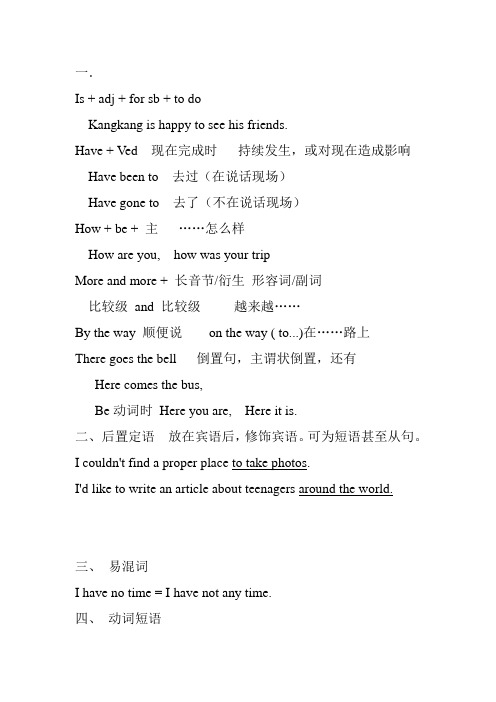
一.
Is + adj + for sb + to do
Kangkang is happy to see his friends.
Have + Ved 现在完成时持续发生,或对现在造成影响Have been to 去过(在说话现场)
Have gone to 去了(不在说话现场)
How + be + 主……怎么样
How are you, how was your trip
More and more + 长音节/衍生形容词/副词
比较级and 比较级越来越……
By the way 顺便说on the way ( to...)在……路上
There goes the bell 倒置句,主谓状倒置,还有
Here comes the bus,
Be动词时Here you are, Here it is.
二、后置定语放在宾语后,修饰宾语。
可为短语甚至从句。
I couldn't find a proper place to take photos.
I'd like to write an article about teenagers around the world.
三、易混词
I have no time = I have not any time.
四、动词短语
Have a 短语Have a good summer holiday; have a hard life Take place 有原因happen 偶然
Give support
五、
六、
七、
八、
九、
十、
实用问句:
Where have you been?。
仁爱英语九上unit1topic2课文及总结笔记

仁爱英语九上unit1topic2课文及总结笔记一、课文概述仁爱英语九上Unit1 Topic2的课文以一个日常生活中的场景为背景,讲述了一段关于友谊的故事。
故事中,主人公Tom和他的朋友Jim在一次偶然的机会下结识了来自不同国家的新朋友。
在这个过程中,他们相互了解、交流,分享了各自的文化,最终成为了更好的朋友。
二、重点词汇和短语1.生词解释- diverse:不同的,多样的- customs:习俗,风俗- exchange:交换- communication:交流2.实用短语- Make friends with:与……交朋友- Share ideas:分享想法- Learn about:了解- Respect each other:互相尊重三、语法解析1.一般现在时一般现在时用于描述经常发生或习惯性的动作。
在本课文中,一般现在时用来描述主人公们之间的友谊以及他们如何相互交流。
2.一般过去时一般过去时用于描述过去发生的动作。
在本课文中,一般过去时用来回忆主人公们是如何结识新朋友的。
3.句子结构本课文中的句子结构多样,有简单句和复合句。
通过学习这些句子,学生可以了解到不同句子的构成以及如何运用恰当的时态。
四、实用对话1.对话内容课文中的对话发生在Tom和Jim与他们的外国朋友之间。
他们在对话中分享了各自国家的文化习俗,以及如何尊重和理解不同的文化。
2.口语技巧在这段对话中,学生可以学习到如何用英语礼貌地提问、回答问题,以及如何表达自己对不同文化的兴趣和尊重。
五、课后练习解答1.问题解答课后练习中的问题主要围绕课文内容、词汇和语法展开。
例如:“请描述Tom和Jim是如何结识新朋友的。
”、“请解释以下句子的时态:‘They often communicate with each other.’”等。
2.解题思路解答这些问题时,需要对课文内容、词汇和语法有充分的了解。
对于描述性问题,要结合课文中的情节进行回答;对于语法性问题,要明确句子所使用的时态并根据题意进行解答。
仁爱英语九上unit1topic2重点知识
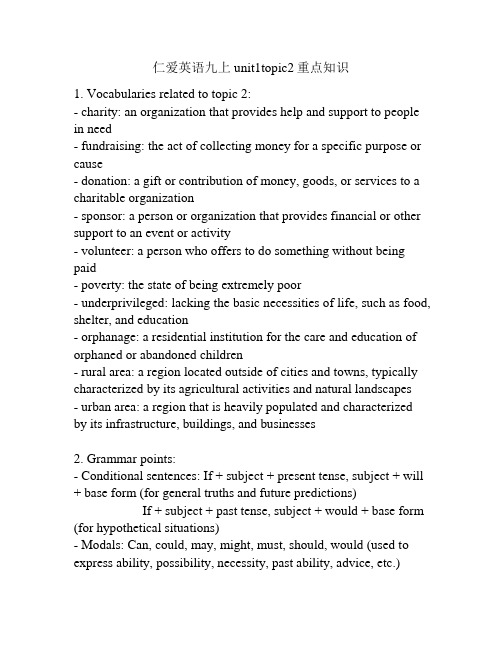
仁爱英语九上unit1topic2重点知识1. Vocabularies related to topic 2:- charity: an organization that provides help and support to people in need- fundraising: the act of collecting money for a specific purpose or cause- donation: a gift or contribution of money, goods, or services to a charitable organization- sponsor: a person or organization that provides financial or other support to an event or activity- volunteer: a person who offers to do something without being paid- poverty: the state of being extremely poor- underprivileged: lacking the basic necessities of life, such as food, shelter, and education- orphanage: a residential institution for the care and education of orphaned or abandoned children- rural area: a region located outside of cities and towns, typically characterized by its agricultural activities and natural landscapes- urban area: a region that is heavily populated and characterized by its infrastructure, buildings, and businesses2. Grammar points:- Conditional sentences: If + subject + present tense, subject + will + base form (for general truths and future predictions)If + subject + past tense, subject + would + base form (for hypothetical situations)- Modals: Can, could, may, might, must, should, would (used to express ability, possibility, necessity, past ability, advice, etc.)3. Sentence structures:- Comparatives and Superlatives: To compare two things, use "than" and the comparative form of an adjective (e.g., taller than). To compare more than two things, use "the" followed by the superlative form (e.g., the tallest).- Passive voice: Subject + to be + past participle (e.g., The food was donated by the local community.)- Wh- questions: Use question words (e.g., who, what, when, where, why, how) to form questions.。
仁爱英语九上unit1topic2课文及总结笔记

仁爱英语九上unit1topic2课文及总结笔记一、课文概述仁爱英语九上Unit1 Topic2的课文以一个日常场景为背景,讲述了主人公John和Mary之间的一段对话。
课文围绕询问时间和安排活动展开,通过对话展示了日常生活中的人们如何交流时间和计划。
二、重点词汇和短语1.生词解释- beforehand:预先,事先- appointment:预约- eventually:最终- precisely:精确地2.实用短语- What time is it?:现在几点了?- It"s time for...:该做...的时候了。
- I have an appointment at...:我有个约会在...。
- Let"s meet at...:我们将在...见面。
三、语法解析1.一般现在时一般现在时用于描述经常发生或习惯性的动作。
例如:I get up at 6:00 every morning.(我每天早上六点起床。
)2.一般过去时一般过去时用于描述过去发生的动作。
例如:I got up at 6:00 yesterday.(我昨天早上六点起床。
)3.被动语态被动语态用于强调动作的承受者。
例如:The window was broken by the ball.(窗户被球打破了。
)四、课后练习解答1.选择题解析- 例题:What time is it?A.It"s 8:30.B.It"s 8:45.C.It"s 8:00.答案:C2.填空题解析- 例题:I have an appointment_______(明天)。
答案:tomorrow3.翻译题解析- 例题:请问你现在几点了?答案:What time is it now?五、实用口语表达1.日常对话示例- A: What time is it?B: It"s 7:30.- A: Do you have any plans for tonight? B: Yes, I"m meeting a friend at 8:00.2.口语交际技巧- 学会用一般现在时描述经常发生的事情。
英语书九年级上册仁爱版笔记 unit1 toplc2

英语书九年级上册仁爱版笔记 unit1 toplc2 Unit 1 Topic 2 笔记一、课文学习1. 熟读课文,理解文章大意。
2. 重点词汇和短语:包括名词、动词、形容词等,如:friendship、invite、agree、housework、boring等。
3. 重点句型和语法:掌握文章中的核心句型和语法,如时态、语态、从句等。
二、听力训练1. 完成课本上的听力练习,认真听录音并答题。
2. 听力材料反复听读,确保理解正确。
三、语法知识1. 学习并掌握本话题的语法知识,如时态、语态、从句等。
2. 练习相关语法结构的用法,如一般现在时态表示经常性、习惯性的动作,过去时态表示过去发生的动作或状态等。
3. 结合例句理解语法结构的含义,并进行相关练习。
四、口语练习1. 跟读课文,模仿语音语调,增强口语表达能力。
2. 围绕话题展开对话,与同学进行交流,提高口语交际能力。
3. 积极参与课堂上的口语活动,如小组讨论、角色扮演等,增强自信心。
五、阅读理解1. 完成课本上的阅读理解题目,提高阅读理解能力。
2. 课外阅读拓展,选择与话题相关的文章进行阅读,增加词汇量,提高阅读水平。
六、写作训练1. 按照话题内容进行写作练习,锻炼写作能力。
2. 注意语法正确、拼写正确、标点符号规范等基本写作要求。
3. 可以参考课本上的范文,学习写作技巧和表达方式。
七、文化知识1. 了解与话题相关的文化知识,如中西文化差异、风俗习惯等。
2. 适当拓展相关知识,增加文化素养。
总之,学习九年级上册仁爱版英语时,要注重听、说、读、写、译等技能的训练,同时也要注重文化知识的积累,全面提高自己的英语综合能力。
仁爱九上英语复习笔记
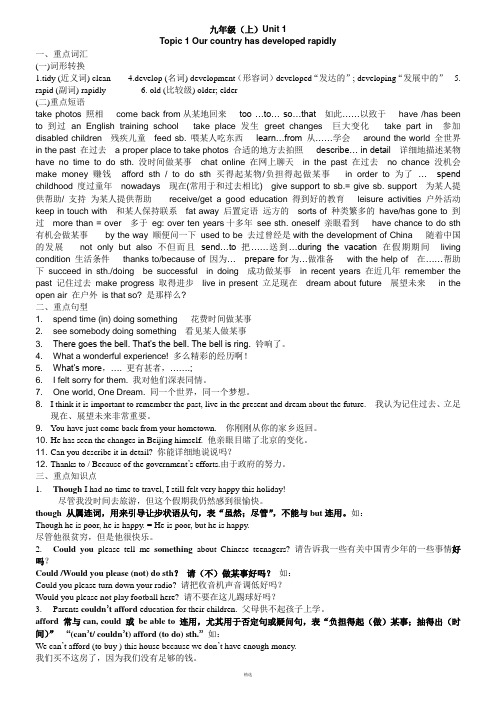
九年级(上)Unit 1Topic 1 Our country has developed rapidly一、重点词汇(一)词形转换1.tidy (近义词) clean 4.develop (名词) development(形容词)developed“发达的”; developing“发展中的” 5. rapid (副词) rapidly 6. old (比较级) older; elder(二)重点短语take photos 照相come back from从某地回来too …to… so…that 如此……以致于have /has been to 到过an English training school take place 发生greet changes 巨大变化take part in 参加disabled children 残疾儿童feed sb. 喂某人吃东西learn…from 从……学会around the world 全世界in the past 在过去 a proper place to take photos 合适的地方去拍照describe… in detail 详细地描述某物have no time to do sth. 没时间做某事chat online 在网上聊天in the past 在过去no chance 没机会make money 赚钱afford sth / to do sth 买得起某物/负担得起做某事in order to 为了… spend childhood 度过童年nowadays 现在(常用于和过去相比) give support to sb.= give sb. support 为某人提供帮助/ 支持为某人提供帮助receive/get a good education 得到好的教育leisure activities 户外活动keep in touch with 和某人保持联系fat away 后置定语远方的sorts of 种类繁多的have/has gone to 到过more than = over 多于eg: over ten years十多年see sth. oneself 亲眼看到have chance to do sth 有机会做某事by the way 顺便问一下used to be 去过曾经是with the development of China 随着中国的发展not only but also 不但而且send…to 把……送到…during the vacation 在假期期间living condition 生活条件thanks to/because of 因为… prepare f or为…做准备with the help of 在……帮助下succeed in sth./doing be successful in doing 成功做某事in recent years 在近几年remember the past 记住过去make progress 取得进步live in present 立足现在dream about future 展望未来in the open air 在户外is that so? 是那样么?二、重点句型1. spend time (in) doing something 花费时间做某事2. see somebody doing something 看见某人做某事3. There goes the bell. That’s the bell. The bell is ring. 铃响了。
仁爱版九年级上册英语Unit1Topic2知识点

Unit 1 Topic 2Sectio n A探短语集锦1. get ost= be lost 迷路;走丢eg: We got lost and could nt fin d'ach other.(同义句)=We were lost and couldntfind each other.2. bad luck!真倒霉!3. call sb up = ring sb up = give sb a call 给某人打电话4. so do I我也一样5. It seems that…=…seem to do 似乎;好像…eg::1) It seemed that Mr. Gree n was a teacher two years ago.(同义句)=Mr. Gree n seemed to be a teacher two years ago.2)It seems that their living conditions were not very good.(同义句)=Their living conditions didn 'seem to be very good.2)He seems to know the secret.(同义句)=It seems that he knows the secret.6. at least 至少at most最多;充其量7. 形容人口多用large来表达,形容人口少用smalleg : a large population / a small population 人口众多/ 人口稀少注意:对人口的数量提问用Whateg: 1) The populatio n of China is over 1.3 billi on.(提问)What's the populati on of China?2) The populati on of In dia is over 1.1 billi on.(提问)What's the populati on of In dia?注意:1)What' s the population of Chi na(同义句)= How large is the populati on of China?2) What's the population of India?(同义句)=How large is the populati on of In dia?8. take place 发生(确定性)happen发生(偶然性)eg: 1) The weddi ng will take place in September.2) A big traffic accident happened to Jim last week.与happen相关的两个短语:1)s th happen to sb某事发生在某人身上2)h appen to sth碰巧做某事eg: 1) A fire accide nt happe ned to Kang Kang last ni ght.1) Lily happe ned to meet her En glish teacher in the park last Sun day.9. because of…由于;因为10. one-child policy:独生子女政策11. used to do sth过去常常做某事be used to doing sth = get used to doing sth 习惯于做某事used to be 过去曾经是There used to be过去曾经有eg: 1) My brother used to play soccer after school.2) Mr. Gree n is used to smok ing.=Mr. Gree n gets used to smok ing.3) Miss Yang used to be a teacher.4) There used to be a bridge in front of my house.5) Lily used ______ (play) basketball in the gym.6) My sister is used to _______ (speak) English.12. in developing countries:在发展中国家In developed coun tries 在发达国家13. 在比较级中,如果比较对象相同,用that代替前面的单数;用those代替前面的复数eg: 1) The weather in Beijing is colder than ________ in Chongqing.2) The population of China is larger than _______ of India.3) The apples on the tree are redder than ______ in the basket.14. too many +可数名词复数too much +不可数名词much too + 形容词many too + 形容词eg: 1) There are too many people in the park on Sun days.2) I don 'like eat ing too much can dy.Sectio n B1. increase by 增加了….in crease to增加到了…eg: 1) Our pay has in creased by¥ 200.2) Our pay has in creased to¥ 2800.2. carry out:执行eg: 1) The policema n carried out a task just now.2) China has carried out the one-child policy to control the population.3.1) so + be助动词/情态动词+另一主语:表示前面提到的肯定情况同样适合另一主语,意为某人也如此eg::a. Jane likes Chinese , _______________________ (莉莉也如此).b. She has bee n to Shan ghai _, _______________________________ (她的弟弟也如此).2)Neither + be/情态动词/助动词+另一主语):表示前面提到过的否定情况同样适合另一主语,意为某人也不....eg: a. No one likes little emperors", ___________________ __________ .(我的父母亲也不喜欢)b. Lily didn 'go to school yesterday, __________________________ .(Jane也没去上学)c. He isn 'a teacher, _______________________ .(我也不是)3)so /neither +同一主语+ be /情态动词/助动词:表示对前面的话的确认,意为的确如此/的确不是这样eg: a. Lily likes English, _______ ___________________(的确如此).b. Li Ming doesn'study hard, ___________________________ .(的确是这样)特别提醒:1)Me, neither. = Neither +助动词/be动词/情态动词+ I2)Me, too. = so + 助动词/be动词/情态动词+ I Sectio n C1. carry out:执行;实行2. more tha n = over 超过;多余3. Live in +地点:居住在某地4. China has the largest population in the world.(同义句)=China has a larger populati on tha n any other country in the world.5. because o f 由于6. be short o:短缺…;缺乏…7. so far:到目前为止;迄今为止8. take many measures :采取措施take measures to do sth 采取措施做某事eg: 1) We should take measures __________ (protect) the environment.2) The government will take many measures ___________ (control) the populatio n.9. work well in doing sth :在…方面起作用eg: It works well in _________ (protect) our teeth.10. be known as = be famous a s 作为…而出名be known for = be famous fo:因…而出名11. have a long way to go:有一条长长的路要走12. face / solve / deal with a problem 面对/ 解决/ 处理问题Sectio n D1. less than 少于;不到与more than是一对反义词组注意:more than = over2. a couple of hours / days 几个小时/天3. unless:连词意为除非在句中引导条件状语从句.可改为if -n-oteg: 1) I won tgo to Lily ' birthday party unless I am invited. 同义句)=I won 'go to the Lily ' birthday party if I am not in vited.2) They won 'go climbi ng unl ess it is fine tomorrow.(同义句)=They won 'go climbi ng if it isn 'fi ne tomorrow.4. far away 遥远5. places of interest 名胜古迹6. keep up with = catch up with 跟上;赶上探精讲精析分数的表达分子用基数词,分母用序数词,先说分子,再说分母,分子大于1,分母要加s eg:三分之二:two thirds五分之三:three fifths二分之一:one sec ond八分之五:five eighths注意:谓语的数由分数所指的名词决定,即分数后的名词如果是复数,谓语的数就用复数,如果是不可数名词或单数名词,谓语的数就用三单形式eg 1) One third of the students _______ to go.2) Two thirds of the teachers ________ (be) men.3) One fifth of the bread ________ (go) bad.4) A quarter of the students ______ (be) girls5) Sixty perce nt of her in come (收入) ___________________ on clothes.探语法聚焦现在完成时常与下列副词(just / already / yet / ever / never /before连用just:意为刚刚置于助动词have / has之后,实义动词之前already:意为已经用于肯定句可置于句中have / has之后,也可置于句末. yet:用于否定句表示还没,尚未),用于一般疑问句时意为已经ever:意为曾经多用于一般疑问句never:意为从来不多用于陈述句表否定before:意为在以前一般置于句末用just / already / yet / ever / never /before填空A1) She knows nothing about the book because she has ___ read it.2) The early bus has _____ left. You have to wait for the next.3) ________________ _ Have they gone fishing?_ No,4) Have they finished their work _____ ?5) Has Mary ______ been to China?6) I've been there _______ and don'want to go there any more.BA: Have you ______ been to France?B: No, I "ve _______ been to any European countries, but Michael has. He says he has _______ been to such a beautiful country before.A: Have you see him ______ ?B: Yes, I have see him ________。
仁爱英语九年级上册Unit1-topic2知识点总结
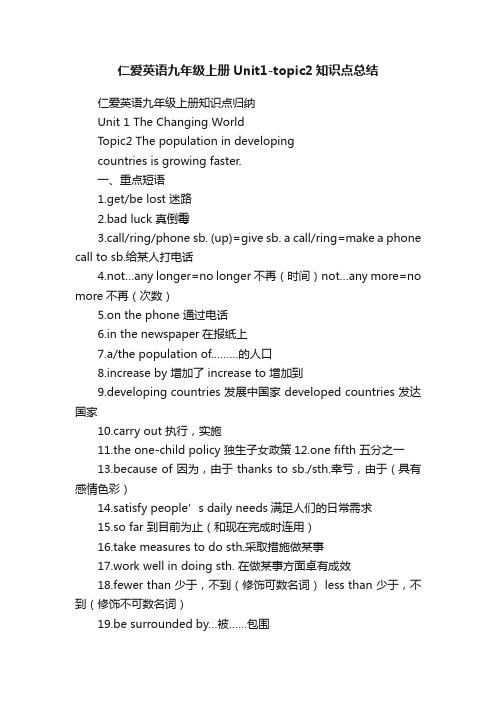
仁爱英语九年级上册Unit1-topic2知识点总结仁爱英语九年级上册知识点归纳Unit 1 The Changing WorldTopic2 The population in developingcountries is growing faster.一、重点短语1.get/be lost 迷路2.bad luck 真倒霉3.call/ring/phone sb. (up)=give sb. a call/ring=make a phone call to sb.给某人打电话4.not…any longer=no longer不再(时间)not…any more=no more不再(次数)5.on the phone 通过电话6.in the newspaper在报纸上7.a/the population of………的人口8.increase by 增加了 increase to 增加到9.developing countries 发展中国家 developed countries 发达国家10.carry out 执行,实施11.the one-child policy 独生子女政策12.one fifth 五分之一13.because of 因为,由于 thanks to sb./sth.幸亏,由于(具有感情色彩)14.satisfy people’s daily needs满足人们的日常需求15.so far 到目前为止(和现在完成时连用)16.take measures to do sth.采取措施做某事17.work well in doing sth. 在做某事方面卓有成效18.fewer than 少于,不到(修饰可数名词) less than 少于,不到(修饰不可数名词)19.be surrounded by…被……包围20.close to…接近于/在……附近21.discourage doing sth. 阻止做某事22.first of all 首先23.belong to 属于24.offer sb.sth.=offer sth. to sb.给某人提供某物二、单词转换1.luck n.幸运 lucky adj. 幸运的 luckily adv. 幸运地2.Russian. 俄罗斯 Russian n. 俄国人,俄语 adj.俄国的,俄国人的,俄语的3.social adj.社会的,社交的 society n.社会4.nature n.自然 natural adj. 自然的5.develop v. 发展 developed adj. 发达的developing adj. 发展中的 development n. 发展三、重点句型1.I have just called you.我刚刚给你打过电话。
(完整版)仁爱英语九年级上册知识点归纳
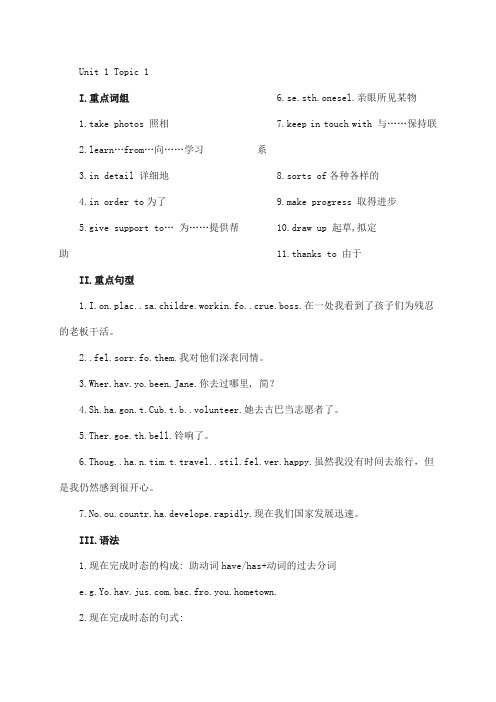
Unit 1 Topic 1I.重点词组1.take photos 照相2.learn…from…向……学习3.in detail 详细地4.in order to为了5.give support to…为……提供帮助6.se.sth.onesel.亲眼所见某物7.keep in touch with 与……保持联系8.sorts of各种各样的9.make progress 取得进步10.draw up 起草,拟定11.thanks to 由于II.重点句型1.I.on.plac..sa.childre.workin.fo..crue.boss.在一处我看到了孩子们为残忍的老板干活。
2..fel.sorr.fo.them.我对他们深表同情。
3.Wher.hav.yo.been.Jane.你去过哪里, 简?4.Sh.ha.gon.t.Cub.t.b..volunteer.她去古巴当志愿者了。
5.Ther.goe.th.bell.铃响了。
6.Thoug..ha.n.tim.t.travel..stil.fel.ver.happy.虽然我没有时间去旅行,但是我仍然感到很开心。
7.No.ou.countr.ha.develope.rapidly.现在我们国家发展迅速。
III.语法1.现在完成时态的构成: 助动词have/has+动词的过去分词.bac.fro.you.hometown.2.现在完成时态的句式:e.g.(1..hav.bee.t.Moun.Huan.wit.m.parents.(2) I haven’t seen him for a long time.(3) Where have you been?(4.——Hav.yo.eve.cleane..room?.——Yes..have..No..haven’t.3.have.ha.been.have/ha.gon.的区别have/has been to sp.表示曾经到过某地—— have/has gone to sp.表示已经去了某地e.g.(1..hav.bee.t.Moun.Huan.wit.m.parents. .(2.Sh.ha.gon.t.Cub.t.b..vo lunteer.Unit 1 Topic 2I.重点词组1. get lost 迷路2. each other 彼此3.at least 至少4take place发生5because of 因为6.b.stric.wit.sb.对某人严格要求.7.carry out 实行8.be short of 缺乏9.take measures to do sth.采取措施做某事10.be known as…作为……而著名11.work well in doing…在……方面起作用12.a couple of 一些13keep up with赶上,跟上II.重点句型1.Hav.yo.foun.hi.yet.你已经找到他了吗?2.——.reall.hat.t.g.shopping.我的确讨厌购物。
原创仁爱版英语九年级Unit1Topic2知识点

Unit 1 Topic 2(Grade Nine)Ⅰ、词组及用法1、too many+名(复数)太多…too much+名(不可数)太多…much too+形容词太…2、get/be lost 走失,迷路eg. We got lost just now.My pen is lost/missing/gone.3、lose one’s way 迷路,迷失方向eg. They lost their way in the dark.(在黑暗中)4、call/ring up=make a telephone call 给…打电话ring/call Tom up=ring/call up Tomring/call him up(宾格代词只能放中间)5、have a population of…有…人口What’s the population of China?中国有多少人口?population(不可数名词),常用large,small,big等修饰,作主语时,谓语动词用单数。
eg. The country has a population of five million=The population of the country is five million.6、increase by+倍数/百分数增加了…倍/百分…increase to+具体数字增加到了eg. The population of this town has increased by 4% .The population of China has increased to billion.7、in developing countries 在发展中国家in developed countries 在发达国家8、carry out the one-child policy 执行独生子女政策9、take measures to do sth 采取措施去做…10、supply(v.)sb with sth=supply sth to sb 供应某人某物supply(n.):供应品、生活用品(常用复数)eg. They cut off(切断)our medicine supplies.11、offer sb sth=offer sth to sb(主动)提供某人某物12、so far 到目前为止(常用现在完成时)13、be known/famous as…作为…而闻名eg. London is known/famous as a foggy city.be known/famous for…因…而著名eg. The island(小岛)is known/famous for its seafood.14、work well in doing sth 在…方面起作用eg. Doing morning exercises works well in building our bodies up.be surrounded by…被…环绕/包围eg. The village is surrounded by mountains.(被动态)15、be careful with/of sth 小心,谨慎等待…16、discourage doing sth 劝阻,劝止eg. We must discourage smoking.17、具体数字+hundred/thousand/million/billion(不加s)不确定数目:hundreds/thousands/millions/billions of+名(用于现在完成时)Ⅱ、辨析1、just,already,yet,ever,never,recently(用于现在完成时)just刚刚:用于肯定句或疑问句中,位于谓语动词前already已经:用于肯定句,位于句中或句末yet还:用于否定句或疑问句中,位于句末recently近来:位于句末ever曾经:用于疑问句中,位于句中never从来不:用于否定句中,位于句中2、such与so用法such a/an+形容词+名词=so+形容词+a/an+名词eg. such a beautiful country=so beautiful a countryso many/much/few/little+名…3、whole与allwhole全部的,所有的,强调整体the whole+名(单)+谓(单)eg. The whole class likes English very much.all 所有的,强调整体中的各个部分all the+名(复数)/不可数eg. All the students like English very much.4、thanks to与because ofthanks to 多亏,由于(表“感谢”的感情色彩)because of 由于(仅表“理由”,没有感情色彩)eg. Thanks to your help,I passed the exam.They didn’t go to the park because of the bad weather.5、huge与large,bighuge巨大的,庞大的,反义词thing(表示数量、体积和程度高)large巨大的,反义词small(多指面积大的)big大的,反义词small(多指体积大,还有“重要”等含义)Ⅲ、语法1、so+be/情态动词/助动词+主语某人/物也一样(表示前面提到的肯定情况同样适合另一个人或物)eg.―They can swim well.―So can we.―Mary likes Chinese.―So does Kate.―He is good at skating.―So am I.若否定的用neither/nor―Helen can’t play basketball.―Neither/Nor can I.so+主语+助动词/be/情态动词确实如此eg.―She went to see her grandparents yesterday.―So she did.―It is a cute cat.―So it is.―He can play the violin well.―So he can.2、分数表达分子用基数词(one ,two ,three …)分母用序数词(first ,second ,third …)当分子大于1,分母变复数eg. one third 31 two thirds 32 分数+of+the+名/代词…eg. Two thirds of the coats are made of cotton.One fifth of them are good at English.Ⅳ、范文China has the largest population in the world. It has caused many problems. Everyone should do something to solve them.First ,the government should keep the one-child policy to control the increasing population ,and practice the reform and opening-up to develop our economy. Only in this way can we get more jobs and improve our living conditions.Second ,the energy and water is becoming less and less. We ’d better save them as much as possible ,and try to find more new energy. In order to solve the problem of heavy traffic ,we call on everyone to take a bus or walk as often as possible.The world is becoming better and better. But it still has many problems. For example ,there ’re many homeless people all over the world. Some children have to be laborers for a living. What ’s worse ,sometimes cruel wars break out in some areas. Some people are homeless because they do not earn enough money or do not have a job. They must work very hard to live. They even cannot raise their children. The governments have worked hard to support the homeless for many years and the world has changed for the better.。
最新仁爱版英语九年级上册Unit1 Topic2知识点 整个话题完整版

Unit1 Topic2SectionA1.在家be in=be at home 外出be out2.just刚刚(用于现在完成时)just now刚才(用于一般过去时)3.before以前(用于现在完成时)ago以前(用于一般过去时)4.不再not···any more=no more (数量上)not···any longer=no longer (时间上)5.太多too many=many(后跟可数名词复数)太多too much=much(后跟不可数名词)太much too=too(后跟形/副)6.走失get lost=be lost=lose one’s way7.打电话call sb. up=ring sb. up=phone sb.=telephone sb. =give sb. a call=give sb. a ring=make a telephone call to sb.8.像那样like that9.我也是。
So do I.(如果一个人的肯定情况也适合另一个人,用:So+be/助/情动+另一个主语) 10.我也不。
Neither/Nor do I.(如果一个人的否定情况也适合另一个人,用Neither/Nor+be/助/情动+另一个主语)11.现在完成时的标志词:just刚刚(用于肯定句)ever曾经(用于疑问句)never从不(用来构成否定句)yet还,仍(用于疑问句或否定句末)already已经(用于肯定句中/末)Unit1 Topic2SectionB1.关于on=about2.在报纸上的内容in the newspaper3.population①形容人口或数量的多少用large,small②做主语时,谓语动词用单数③问人口有多少:What’s the population of China?It’s···4.增加了increase by 增加到increase to5.到达get to=arrive in/at=reach特殊用法:够不着out of reachreach+具体数字I’ll call you when I arrive.6.发展中国家developing countries发达国家developed countries欠发达的less developed7.的确如此。
仁爱版英语九年级上册Unti1---Unit2 考点复习总结

仁爱版英语九年级上册考点(unit 1-unit 2)【教材回归 考点过关】1.have/has been to 表“曾经去过某地”(去而复返)区别:have/has gone to 表“已经去某地了”如: I have been to Shanghai.(去过上海,已经回来)He has gone to Shanghai.(去上海了,不在此处)2.have (no) time to do sth 做某事(没)有时间Tom is busy helping his mother with housework, he has no time to play with you. 汤姆忙于帮助妈妈做家务,他没有时间和你玩3.What’s the population of...? 对人口提问=How large is the population of ...What’s the population of China? 中国的人口是多少?How large is the population of China?注:人口不能用many/much 修饰,但是how many people 对多少人提问这样是可以的。
How many people are there in China?=What’s the population of China? 4.What do you mean by sth.?某物是什么意思呢?= What’s the meaning of sth.? = What does sth.mean?如:What do you mean by the word? 这个单词是什么意思?= What’s the meaning of the word?= What does the word mean?5.----How long have you been like this? 你处于这样的状态多久了?---- I have been like this since last month.自从上个月以来我一直这样。
(完整版)仁爱英语九年级上册知识点归纳
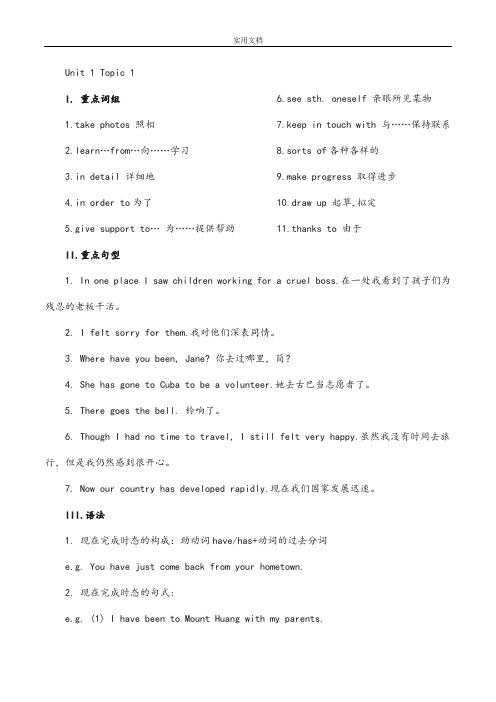
Unit 1 Topic 1I. 重点词组1.take photos 照相2.learn…from…向……学习3.in detail 详细地4.in order to为了5.give support to…为……提供帮助6.see sth. oneself 亲眼所见某物7.keep in touch with 与……保持联系8.sorts of各种各样的9.make progress 取得进步10.draw up 起草,拟定11.thanks to 由于II.重点句型1. In one place I saw children working for a cruel boss.在一处我看到了孩子们为残忍的老板干活。
2. I felt sorry for them.我对他们深表同情。
3. Where have you been, Jane? 你去过哪里,简?4. She has gone to Cuba to be a volunteer.她去古巴当志愿者了。
5. There goes the bell. 铃响了。
6. Though I had no time to travel, I still felt very happy.虽然我没有时间去旅行,但是我仍然感到很开心。
7. Now our country has developed rapidly.现在我们国家发展迅速。
III.语法1. 现在完成时态的构成:助动词have/has+动词的过去分词e.g. You have just come back from your hometown.2. 现在完成时态的句式:e.g. (1) I have been to Mount Huang with my parents.(2) I haven’t seen him for a long time.(3) Where have you been?(4) ——Have you ever cleaned a room? ——Yes, I have. / No, I haven’t.3. have/ has been与 have/has gone 的区别have/has been to sp.表示曾经到过某地—— have/has gone to sp.表示已经去了某地e.g. (1) I have been to Mount Huang with my parents. (2) She has gone to Cuba to be a volunteer.Unit 1 Topic 2I. 重点词组1. get lost 迷路2. each other 彼此3.at least 至少4take place发生5because of 因为6.be strict with sb. 对某人严格要求7.carry out 实行8.be short of 缺乏9.take measures to do sth.采取措施做某事10.be known as…作为……而著名11.work well in doing…在……方面起作用12.a couple of 一些13keep up with赶上,跟上II.重点句型1. Have you found him yet? 你已经找到他了吗?2. ——I really hate to go shopping. 我的确讨厌购物。
仁爱版九年级上Unit 1 Topic2重点笔记与知识点整合复习(无答案)
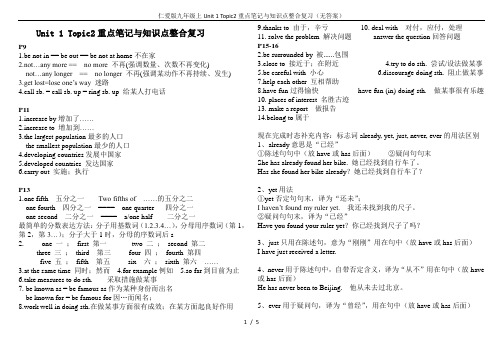
Unit 1 Topic2重点笔记与知识点整合复习P91.be not in == be out == be not at home不在家2.not…any more == no more 不再(强调数量、次数不再变化)not…any longer == no longer 不再(强调某动作不再持续、发生)3.get lost=lose one’s way 迷路4.call sb. = call sb. up = ring sb. up 给某人打电话P111.increase by增加了……2.increase to 增加到……3.the largest population最多的人口the smallest population最少的人口4.developing countries发展中国家5.developed countries 发达国家6.carry out 实施;执行P131.one fifth 五分之一Two fifths of ……的五分之二one fourth 四分之一==== one quarter 四分之一one second 二分之一==== a/one half 二分之一最简单的分数表达方法:分子用基数词(1.2.3.4…),分母用序数词(第1,第2,第3…);分子大于1时,分母的序数词后s2. one 一;first 第一two 二;second 第二three 三;third 第三four 四;fourth 第四five 五;fifth 第五six 六;sixth 第六……3.at the same time 同时;然而4.for example例如5.so far到目前为止6.take measures to do sth. 采取措施做某事7. be known as = be famous as作为某种身份而出名be known for = be famous for因…而闻名;8.work well in doing sth.在做某事方面很有成效;在某方面起良好作用9.thanks to 由于,辛亏10. deal with 对付,应付,处理11. solve the problem 解决问题answer the question回答问题P15-162.be surrounded by 被......包围3.close to 接近于;在附近4.try to do sth. 尝试/设法做某事5.be careful with 小心6.discourage doing sth. 阻止做某事7.help each other 互相帮助8.have fun过得愉快have fun (in) doing sth. 做某事很有乐趣10. places of interest 名胜古迹13. make a report 做报告14.belong to属于现在完成时态补充内容:标志词already, yet, just, never, ever的用法区别1、already意思是“已经”①陈述句句中(放have或has后面)②疑问句句末She has already found her bike. 她已经找到自行车了。
- 1、下载文档前请自行甄别文档内容的完整性,平台不提供额外的编辑、内容补充、找答案等附加服务。
- 2、"仅部分预览"的文档,不可在线预览部分如存在完整性等问题,可反馈申请退款(可完整预览的文档不适用该条件!)。
- 3、如文档侵犯您的权益,请联系客服反馈,我们会尽快为您处理(人工客服工作时间:9:00-18:30)。
U n i t1T o p i c2重点笔记与知识点整合复习P9not in == be out == be not at home不在家…any more == no more 不再(强调数量、次数不再变化)not…any longer == no longer 不再(强调某动作不再持续、发生) lost=lose one’s way 迷路sb. = call sb. up = ring sb. up 给某人打电话P11by增加了……to 增加到……largest population最多的人口the smallest population最少的人口countries发展中国家countries 发达国家out 实施;执行one-child policy独生子女政策P13fifth 五分之一Two fifths of ……的五分之二one fourth 四分之一==== one quarter 四分之一one second 二分之一==== a/one half 二分之一最简单的分数表达方法:分子用基数词(1.2.3.4…),分母用序数词(第1,第2,第3…);分子大于1时,分母的序数词后s2. one 一;first 第一two 二;second 第二three 三;third 第三four 四;fourth 第四five 五;fifth 第五six 六;sixth 第六……the same time 同时;然而example例如far到目前为止measures to do sth. 采取措施做某事7. be known as = be famous as作为某种身份而出名be known for = be famous for因…而闻名;well in doing sth.在做某事方面很有成效;在某方面起良好作用to 由于,辛亏10. deal with 对付,应付,处理11. solve the problem 解决问题answer the question回答问题P15-161. the one-child =the only child 独生子surrounded by 被......包围to 接近于;在附近to do sth. 尝试/设法做某事careful with 小心doing sth. 阻止做某事each other 互相帮助fun过得愉快have fun (in) doing sth. 做某事很有乐趣9.the capital of China 中国的首都10. places of interest 名胜古迹sb./sth. to some place 带某人或某物去某地12.Tian’anmen Square 天安门广场13. make a report 做报告to属于family 大家庭nuclear family 核心家庭现在完成时态补充内容:标志词already, yet, just, never, ever的用法区别1、already意思是“已经”①陈述句句中(放have或has后面)②疑问句句末She has already found her bike. 她已经找到自行车了。
Has she found her bike already?她已经找到自行车了?2、yet用法①yet否定句句末,译为“还未”;I haven’t found my ruler yet.我还未找到我的尺子。
②疑问句句末,译为“已经”Have you found your ruler yet?你已经找到尺子了吗?3、just只用在陈述句,意为“刚刚”用在句中(放have或has后面)I have just received a letter.4、never用于陈述句中,自带否定含义,译为“从不”用在句中(放have 或has后面)He has never been to Beijing. 他从未去过北京。
5、ever用于疑问句,译为“曾经”,用在句中(放have或has后面)Have you ever been to Beijing? 你曾经去过北京吗?Unit 1 Topic2综合测试题(满分100)一、根据首字母及汉语提示写出单词。
(每小题1分)10"1. We may meet many d__________ (困难), but don’t be afraid them. changes have taken place in China in r_________(最近的)years.3. Our country carried out one-child p (政策)4. Li Ming is an e__________(优秀的)student.5. The population is (增加)by2﹪in this country6.China has the largest p_____________.(人口)Lei doesn’t like apples. N_______ do I.(我也不喜欢)8. He has p______________(很可能)gone home.’ll take m(措施)to help you with your English.can learn English better now _________ _______(因为) his help.二、用所给单词的适当形式填空。
(每小题2分)20"11. _________ (thank) to your help, I can pass the exam.to the people’s republic of China .( belong )13The government measures to save pandas already. (take) 14. The one-child policy has worked in controlling China’s population.(good)15.China has the population with billion in the world.(large)16. The population is _____________ by 80 million every year.(increase)17. Our school has ___________ out many new rules this term.(carry)18. He had a traffic accident. ____________ , he wasn’t badly hurt.(luck)19. India has the __________largest population in the world. (two)20. Have you ever _________the novel? (read)三、将下列汉语译成英语。
(每小题3分)15"21. (五分之二)of the students are from countryside .22. –They like playing computer games .–( 我们也是).23. London (作为…而闻名) a foggy city.24. –Maria has much progress in Chinese.–_____ ______ (的确如此).25. We will (采取一些措施)to protect our homes四、单项选择(每小题1分)35"( ) must the policy to control the heavy traffic in the city.A. carry outB. take outC. bring outD. look out ( ) 27. The population of Shanghai is larger than _____ of Shenyang.A. thatB. itC. oneD. this ( ) 28. —_____ the population of the in 2005?—It _____ about 296 million.A. What is; isB. What was; wasC. How many is; wasD. How many was; is ( ) of the teachers are women in our school.A. Two thirdB. Two threesC. Two thirdsD. Second three ( ) 30. He’s read this book before, _____?A. hasn’t heB. doesn’t heC. isn’t heD. wasn’t he ( ) 31.—Kangkang is good at English.—.He often speaks to foreigners.is he. he is. was he he was.( ) little girl has _____ finished reading the book you lent her.A. alreadyB. yetC. stillD. once( ) 33.—What has happened in your hometown?—Great changes _____ in my hometown recently.A. have been taken placeB. have taken placeC. have been happenedD. was happened( ) usually sleep with the window open it is very old.( ) 35.—I have never visited a paper factory. —_____A. So have I.B. So I have.C. Neither have I. haven’t yet. ( ) had great difficulty it. But he didn’t give up .A. finishingB. finishedC. finishD. to finish ( ) 37.—Have you improved your written English ?—Yes, I’ve improved it.A. already, yetB. yet, yetC. already, already D yet,. already( ) 38.—The population of our city is than that of yours.—Yes, You’re right .A. moreB. fewerC. largerD. Less( ) 39.—Do you know who Mark Twain was?—Of was a famous American writer.to be for as for( ) Yang is strict us.( ) 41. We have to work hard to the quick development of modern society.in with up with up up with( ) 42. We are short _____ energy and water the over population .A. of; becauseB. of ; because ofC. in; because of ( ) 43. —He has _____ his dictionary . Have you seen it?—Yes, of course. I _____ it on your desk just now.A. lose; sawB. lost; have beenC. lost; sawD. losed; saw ( ) people live in Asia now.A. More than three billionsB. More than three billion ofC. More than three billion than three billions of( ) 45.—I _____ Fujian Museum twice. How about you?—Never. I hope to visit it soon .A. have gone toB. have been toC. have goneD. went to ( ) 46. There is _____ snow outside, so it is ______cold today.A. too many, too muchB. too much, too manyC. too much, much tooD. too many, much too( ) 47. I really hate ______ by air.A. travelingB. traveledC. to travelingD. travel to ( ) 48. I’m good at swimming, ______ my sister.A. so doesB. neither doesC. so isD. neither is ( ) 49. —Have you ______ been to Hongkong? —No, I have ______.A. never, neverB. ever, neverC. just, alreadyD. yet, already ( ) 50. He seems must pass the exam.A. happilyB. be happyC. very happyD. to happy ( ) 51. ______ the population of Chongqing in 2008 ?A. How much isB. How many wasC. What isD. What was ( ) 52. Our teacher is stricted ______ us now than before.A. inB. toC. withD. at( ) 53. —What are you going to do this weekend ? —I ______ yet.A. haven’t decidedB. won’t decideC. have decidedD. didn’t decide( ) 54. He says he has never seen ______ beautiful scenery before.A. soB. such aC. suchD. so a( ) 55. ______ have taken place in our school.A. Great changeB. Great changesC. A great changeD. Much change ( ) are sixty teachers in our of them are women.A. Two thirdB. Two threesC. Two thirdsD. Second three ( ) ’s read this book before, _____?A. hasn’t heB. doesn’t heC. isn’t heD. wasn’t he ( ) _____ population has caused many serious problems.A. increaseB. increasedC. increasingD. increases ( ) 59.—Have you found your lost book_____? —No, I haven’t.A. alreadyB. yetC. stillD. once ( ) 60. —How much is the white coat? —It’s_____yuan.A. one thousand, six hundred, eighty-eightB. one thousand six hundred eighty-eightC. one thousand, six hundred and eighty-eightD. one thousand and six hundred and eighty-eight五、完形填空(每小题1分)10"What is the population of China? There are more than a billion and three hundred million people in China. It is almost one fifth of the world’spopulation. How to control the population growth is a big problem. Some people think 1 control the population growth. But I don’t agree 2 them, because where there’s a will, there is a way.The question is that we should make it 3 how serious the population problem is. Our farmland is becoming less and less to everyone. We have already got too many mouths to feed. 4 we control the population growth, many people will die 5 hunger. Too fast population growth has been and will be bad for our nation. Though laws(法律) have been 6 to control the population growth, in some places 7 is done to carry out the law. We should make people 8 that it is foolish to bring too many children into the world. They should 9 do what they have been doing for many years. We are fighting against the rapid population growth. Yes, the fighting won’t end 10 everyone knows its importance and does something for it. Let’s go on working hard on it together.( ) 6 B. impossible ofC. that is impossible ofD. it impossible to( ) 62A.to B. for C. with D. on( ) 6 B. known by everybodyC. know to everybodyD. know by everybody( ) 64. A. If not B. Unless C. Until D. If( ) 65 .A. of B. about C. from D. out of( ) 66 A. pass B. passed C. broken D. past( ) 67. A. many B. little C. a lot D. much ( ) 68. A. to know B. to learn C. know D. learning ( ) 69. A. not longer B. not more C. no longer D. no more ( ) 70. A. until B. after C. when D. A六、阅读理解。
